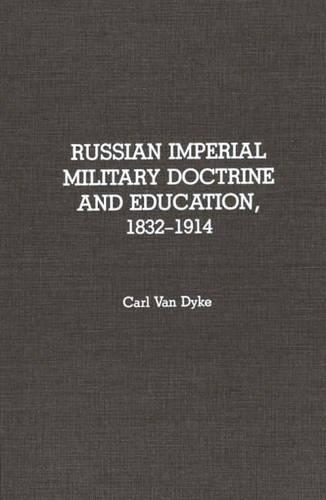
Russian Imperial Military Doctrine and Education, 1832-1914
(Hardback)
Publishing Details
Russian Imperial Military Doctrine and Education, 1832-1914
By (Author) Carl Van Dyke
Bloomsbury Publishing PLC
Praeger Publishers Inc
29th November 1990
United States
Classifications
Tertiary Education
Non Fiction
History: specific events and topics
355.007047
Physical Properties
Hardback
216
Width 156mm, Height 235mm
482g
Description
This work examines the evolution of military-scientific research and theory as it was taught to student-officers at the Nicholas Academy. It is the only work (in English or Russian) to focus on this intellectual-institutional dialogue in the context of evolving professional responsibilities of the Russian Imperial General Staff during the 19th and early 20th centuries. The book contains five portraits of influential Russian military theorists and educational administrators. "Russian Imperial Doctrine" features extensive use of original Russian language bibliographic sources and extensive use of French, British and American archival sources. Chapter 1 examines the introduction of post-Napoleonic strategic theory to Russian military traditions via the establishment of a higher military-educational institution to instruct officers of the Russian Imperial Army in the theory of conducting large-scale warfare. Chapter 2 illustrates the interaction of the liberal intellectual community at the Academy with the Imperial Russian Geographical Society in the years before the Crimean War (1853-56). Chapter 3 begins with a discussion of the confusion in the Russian military liberal-intellectual community over the wild fluctuations in Imperial policy toward reform in the mid to late-1850s. This is followed by a discussion of the era of institution-wide reform in the Russian Army and the Nicholas Academy under the tutelage of the newly appointed War Minister, D.A. Miliutin. Chapter 4 discusses the dismissal of War Minister D.A. Miliutin in 1881 and the extent to which political conservatism dismantled the reformed military institutions and effected the curriculum of the Nicholas Academy. Chapter 5 discusses the reform of military institutions and theory in the wake of the Russo-Japanese War in 1904-5. This book serves equally well as a text for courses in Russian history, European military policy and strategy, the history of operational art, and military command and leadership.
Reviews
Basing his work on extensive research in French and British primary sources, in Russian sources at the Hoover Institution, and on an exhaustive mastery of published primary and secondary sources, Van Dyke has written an instructive work on the burdens carried by technical elites in modernizing societies. He has thereby not only made a contribution to Russian military history, but also to the institutional history of modernization.-The Historian
"Basing his work on extensive research in French and British primary sources, in Russian sources at the Hoover Institution, and on an exhaustive mastery of published primary and secondary sources, Van Dyke has written an instructive work on the burdens carried by technical elites in modernizing societies. He has thereby not only made a contribution to Russian military history, but also to the institutional history of modernization."-The Historian
Author Bio
CARL VAN DYKE is a researcher at the University of Edinburgh, Scotland.
